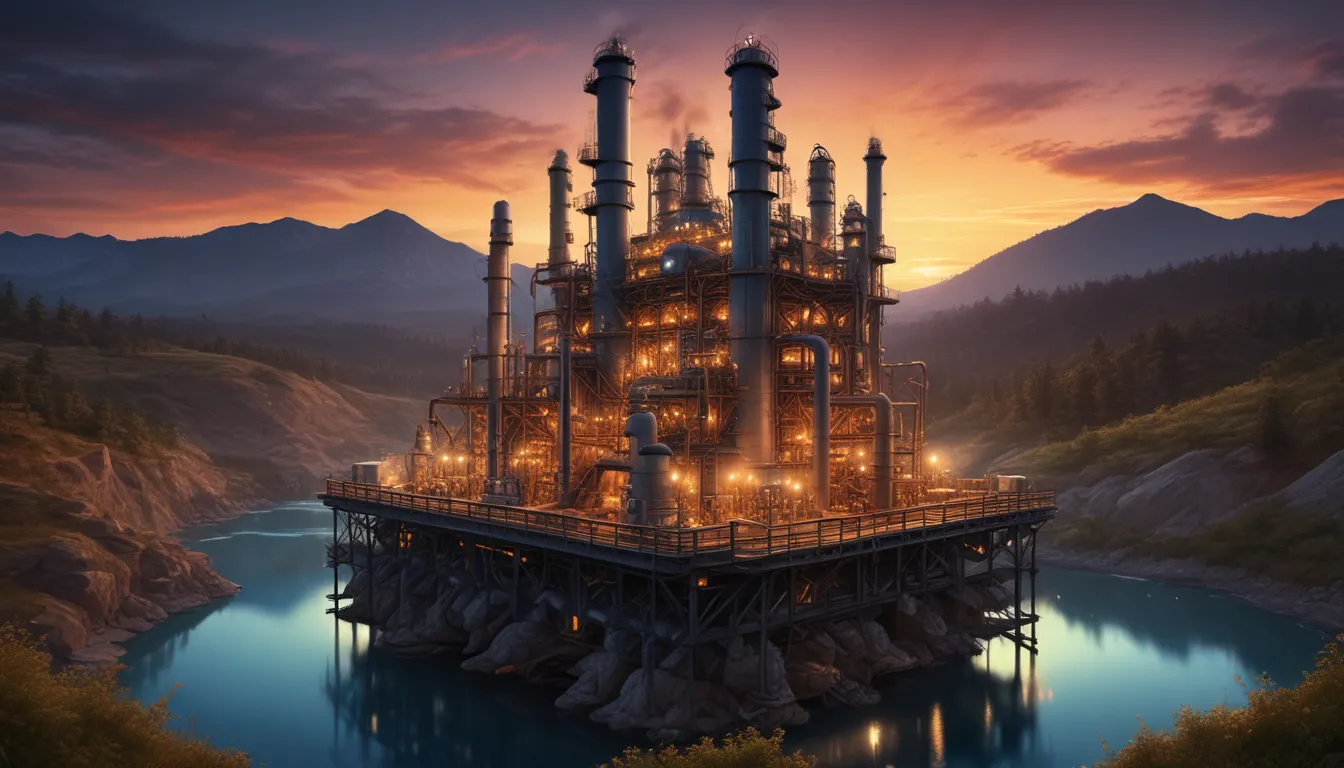A Note About Images: The images used in our articles are for illustration purposes only and may not exactly match the content. They are meant to engage readers, but the text should be relied upon for accurate information.
Natural gas, a versatile and abundant source of energy, has a captivating story spanning from its formation deep within the Earth to its modern-day applications. In this article, we will delve into 19 fun facts about natural gas, shedding light on its history, composition, uses, and environmental impact. Whether you are a curious individual or a student of science, these intriguing facts will deepen your understanding of this essential energy resource. So, let’s embark on a journey into the world of natural gas and uncover some surprising and enlightening tidbits along the way.
Understanding the Basics
- Natural Gas is Mostly Made of Methane: Primarily composed of methane, natural gas is a clean-burning alternative to coal and oil, serving as a crucial component of the world’s energy supply.
- Natural Gas is Odorless and Colorless: In its pure state, natural gas is undetectable to human senses. To enhance safety, an odorant called mercaptan is added, giving natural gas its recognizable “rotten egg” smell.
- Natural Gas is Formed from Ancient Organic Matter: Originating from decomposed organic material subjected to heat and pressure over millions of years, natural gas reserves are found deep within the Earth’s crust.
The Abundance of Natural Gas
- Natural Gas is Abundantly Available: With vast reserves located underground, natural gas is a widely accessible energy source found in various regions across the globe.
- Natural Gas is Continuously Explored and Developed: Ongoing exploration efforts aim to discover new reserves and enhance extraction technologies, contributing to the expansion of natural gas resources.
Diverse Applications
- Natural Gas is Used for Heating and Cooking: A primary energy source for residential and commercial heating and cooking, natural gas offers a reliable and efficient option for households.
- Natural Gas is Used for Electricity Generation: Playing a key role in electricity production, natural gas powers gas-fired turbines and combined-cycle power plants, emitting lower levels of greenhouse gases compared to other fuels.
- Natural Gas is Utilized in Vehicle Fuel: As a cleaner-burning fuel for transportation, natural gas is employed in compressed and liquefied forms for buses, trucks, and fleet vehicles.
Industry Impact
- Natural Gas is a Vital Industrial Feedstock: Serving as a crucial material for various industries, natural gas is used in the production of ammonia, hydrogen, methanol, fertilizers, chemicals, and plastics.
- Natural Gas is Subject to Stringent Safety Regulations: Stringent safety measures govern the production, transportation, and usage of natural gas, ensuring operational integrity and public safety.
Environmental Considerations
- Natural Gas is a Cleaner Alternative: Emitting lower levels of greenhouse gases and air pollutants, natural gas combustion is considered a cleaner energy option compared to coal and oil.
- Natural Gas is a Focal Point of Environmental Stewardship: Emphasizing emissions reduction and sustainable practices, the natural gas industry is committed to environmental responsibility and sustainable energy solutions.
Global Impact
- Natural Gas is a Major Global Energy Resource: Playing a vital role in meeting global energy needs, natural gas is a versatile, abundant, and cleaner-burning component of the global energy mix.
- Natural Gas is a Key Component of the Energy Transition: Supporting the transition to sustainable energy, natural gas facilitates the integration of renewable sources while contributing to a lower-carbon energy landscape.
Looking Ahead
- Natural Gas is a Reliable Energy Source: Recognized for its reliability, natural gas provides a consistent and steady energy supply for residential, commercial, industrial, and power generation sectors.
- Natural Gas is a Source of Economic Benefits: The natural gas industry generates economic benefits through job creation, investment opportunities, and revenue generation, fostering economic growth and infrastructure development.
Conclusion
In conclusion, natural gas is an essential and adaptable energy source that offers a wide range of benefits, from its cleaner-burning properties to its reliability and economic impact. As we continue to explore and innovate in natural gas production and utilization, we can look forward to more efficient and sustainable ways of harnessing this abundant energy resource.
FAQs
- What is natural gas?: Natural gas is a naturally occurring hydrocarbon gas mixture primarily composed of methane along with other hydrocarbons and trace amounts of non-hydrocarbon gases.
- How is natural gas formed?: Natural gas is formed from the remains of ancient plants and animals that were buried and exposed to heat and pressure over millions of years.
- What are the main uses of natural gas?: Natural gas is used for heating, cooking, electricity generation, vehicle fuel, and industrial processes.
- Is natural gas environmentally friendly?: Compared to other fossil fuels, natural gas is considered a cleaner-burning fuel, producing lower levels of greenhouse gas emissions and air pollutants.
- How is natural gas transported?: Natural gas is transported through pipelines or in liquefied form (LNG) via specialized tankers.
Embracing Trustworthy Information
Our commitment to delivering trustworthy and engaging content ensures that each fact shared is contributed by real users like you, bringing diverse insights and information. Dive into the world of natural gas with confidence, knowing that our dedicated editors meticulously review each submission to ensure the highest standards of accuracy and reliability. Trust in our commitment to quality and authenticity as you explore and learn about the wonders of natural gas.






